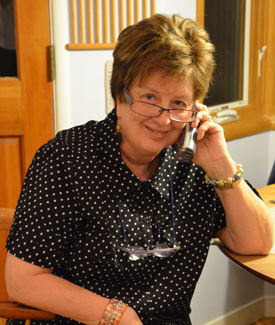For Berkeley’s newest Nobel winner, ‘Groundhog Day’ has a happy ending
Randy Schekman, who's been on the short list of likely laureates for years, "knew it wasn’t a hoax because I recognized the voice" on the other end of the line.

October 7, 2013
Randy Schekman returned home from Germany Sunday night, the five-pound bronze medallion of one of that country’s top biochemistry prizes in his carry-on. Jet-lagged and exhausted, he was asleep by 9 p.m.

Upon learning he’d won the Nobel, Schekman “started trembling,” then spent much of the morning on the phone. (Carol Ness photos)
He barely heard the phone ring a few short hours later.
“This is it! This is it!” cried out his wife of more than 40 years, Nancy Walls, handing her husband the phone at 1:30 a.m. Monday. Stockholm was on the line.
“My heart started to race,” Schekman recounted before daybreak this morning, in the few free moments between calls from friends, family and media from around the world. Already, TV cameras were recording the moment in the El Cerrito home Schekman and Walls have lived in for 36 years, since the year after he arrived at UC Berkeley as a young biochemistry professor.
“I started trembling,” he continued. Seconds later – a moment long hoped for, but never expected — Schekman heard for himself the news that he had won the 2013 Nobel Prize in Physiology or Medicine, sharing it with two other scientists.
“I knew it wasn’t a hoax because I recognized the voice,” said Schekman. “I had worked on his committee.”
In 2002, he and one of his co-winners, James Rothman of Yale, won the Lasker Prize, considered an indicator of Nobel potential. So the first Monday after the first Sunday in October — the day the prize in physiology or medicine is announced — has always been fraught with the need to manage hopes.
Each year, after early morning has come and gone with no call from Sweden, Schekman and Rothman would talk to each other. “I came to call it our ‘Groundhog Day,’” he joked, referring to the movie in which Bill Murray is forced to face the same day over and over again.
This year, like the movie, the story had a happy ending. By the time the sun rose this morning, Schekman and Rothman had already exchanged congratulations.
‘Things are nuts’

Nancy Walls, Schekman’s wife, was the first to know.
His first call, though, went to his father, in the Southern California town of Tustin. Schekman said his father always believed his son was Nobel material, but at 86, didn’t have many years left to share the moment — if it ever came.
“I was delighted to be able to deliver this news,” Schekman said, whose mother died in 1998.
The next calls were to Schekman and Walls’ two children, both in their 30s.
His daughter, Lauren, who works in finance in Portland, responded with a decidedly non-academic exclamation of delight, reported Schekman: “She was stunned.”
Son Joel, a classical clarinetist and music teacher in Grand Rapids, Mich., didn’t pick up the phone. The two talked later. Schekman also called the manager of his lab in the Li Ka Shing Center for Biomedical and Health Sciences, and asked him to buy a couple of bottles of Champagne and put them on ice.
First, though, came the bright lights of the media. As Schekman raced from interview to interview — from the TV cameras in his living room to his iPhone to his landline to Skype on his computer — Walls and a longtime friend and neighbor settled in the kitchen, made coffee and scanned early headlines for the news.
“Things are nuts,” Walls told their son at one point. “The phone is ringing off the hook.”
This is the life of a Nobel winner, and Schekman — a funny and articulate proselytizer for the importance of the kind of basic science rewarded by the Nobel — seized the opportunity with zest. He dressed for the occasion in a blue sports jacket and blue suede shoes procured on a recent trip abroad.
Again and again, he explained what he and his research team do with yeast and cells and genes and protein in his lab. And he explained that his work is on the fundamentals of science, not its applications — though they’ve proved immensely useful in leading the way to techniques for mass-producing important drugs like insulin.
“Governments around the world have to realize that their investments in basic research pay off down the line,” he told an interviewer in Colombia.
“Without the investment of public funds, my work never would have been possible,” he said.
The Nobel will change his life, Schekman acknowledged. But amid all the accolades, prestige and demands the honor brings, he also hopes to share the spotlight with UC Berkeley.
“I want to use this to help the university, if I can, because the university has been so important to my success. I spent my entire career here,” he said. “Berkeley provided the environment for me to do my own thing, without pressure to do something practical.”
Being at Berkeley meant teaching, too, which Schekman says has helped him bring clarity to his ability to present his research to other scientists and to the world.
Winning the Nobel Prize, Schekman said, stands unquestionably as one of the big moments of his life — right up there with the day he and Walls married, and the births of their children.
“You look at who’s won the Nobel prize and it’s the roster of the scientific leadership of the 20th century,” Schekman said. “To share that stage with them — it’s daunting. I’m humbled.”
See also: